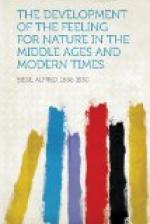The greater the knowledge of self, the richer the inner life. Man becomes his own chief problem—he begins to watch the lightest flutter of his own feelings, to grasp and reflect upon them, to look upon himself in fact as in a mirror; and it is in this doubling of the ego, so to speak, that sentimentality in the modern sense consists. It leads to love of solitude, the fittest state for the growth of a conscious love of Nature, for, as Rousseau said ’all noble passions are formed in solitude,’ ’tis there that one recognizes one’s own heart as ’the rarest and most valuable of all possessions.’ ‘Oh, what a fatal gift of Heaven is a feeling heart!’ and elsewhere he said: ’Hearts that are warmed by a divine fire find a pure delight in their own feelings which is independent of fate and of the whole world.’ Euripides, too, loved solitude, and avoided the noise of town life by retiring to a grotto at Salamis which he had arranged for himself with a view of the sea; for which reason, his biographer tells us, most of his similes are drawn from the sea. He, rather than Petrarch or Rousseau, was the father of sentimentality. His morbidly sensitive Hippolytos cries ’Alas! would it were possible that I should see myself standing face to face, in which case I should have wept for the sorrows that we suffer’; and in the chorus of The Suppliants we have: ’This insatiate joy of mourning leads me on like as the liquid drop flowing from the sun-trodden rock, ever increasing of groans.’ In Euripides we have the first loosening of that ingenuous bond between Nature and the human spirit, as the Sophists laid the axe to the root of the old Hellenic ideas and beliefs. Subjectivity had already gained in strength from the birth of the lyric, that most individual of all expressions of feeling; and since the lyric cannot dispense with the external world, classic song now shewed the tender subjective feeling for Nature which we see in Sappho, Pindar, and Simonides. Yet Euripides (and Aristophanes, whose painful mad laugh, as Doysen says, expresses the same distraction and despair as the deep melancholy of Euripides) only paved the way for that sentimental, idyllic feeling for Nature which dwelt on her quiet charms for their own sake, as in Theocritus, and, like the modern, rose to greater intensity in the presence of the amorous passion, as we see in Kallimachos and the Anthology. It was the outcome of Hellenism, of which sentimental introspection, the freeing of the ego from the bonds of race and position, and the discovery of the individual in all directions of human existence, were marks. And this feeling developing from Homer to Longos, from unreflecting to conscious and then to sentimental pleasure in Nature, was expressed not only in poetry but in painting, although the latter never fully mastered technique.




